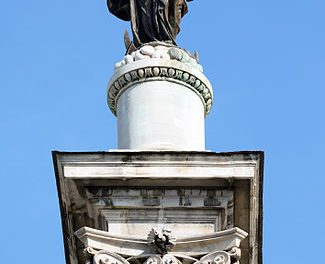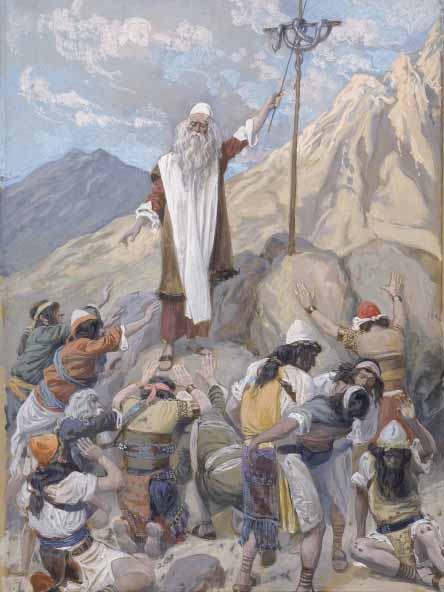Reflections for May 22, 2011
We are good at labels: conservative versus liberal, red state versus blue state, pro-life versus pro-choice. These labels are often reductive and lacking nuance, and even more often, such labels create unnecessary antagonism in a community, and yet we still use them. As human beings, we are prone to this unfortunate tendency of seeing the world in terms of white and black, either/or, us versus them. One of the goals of this blog is to overcome such dualistic tendencies as you can see in our mission statement:
We recognize that we as a group will have disagreements, but want to avoid the standard “liberal /conservative” divide that often characterizes contemporary conversation, as well as the bitterly divisive tone of so much ethical discussion (particularly on the internet). We therefore endeavor to converse with each other and others in a spirit of respect, charity, and humility.
In the Catholic Church today, we have some new operative labels fracturing the community. There is a tension between what we might call “traditional” or “evangelical Catholics” and “social justice Catholics.” We saw just how divisive these labels were last year when Glenn Beck told his listeners that if they found the words “social justice” or “economic justice” on their church’s website, they should leave their church. For Beck and for many of his supporters, “social justice” was a code word for “socialist” or “left-wing radical.” Beck was rightly criticized by Catholics like James Martin, S.J. who illustrated how the social mission of the Church was an integral part of Catholic teaching (a point which Tobias Winright reaffirmed more recently here):
Glenn Beck’s desire to detach social justice from the Gospel is a subtle move to detach care for the poor from the Gospel. But a church without the poor, and a church without a desire for a just social world for all, is not the church. At least not the church of Jesus Christ.
Who was, by the way, poor.
While there weren’t tons of Catholics supporting Glenn Beck, there were then and still are a good number who think the assumption about the “social justice” label is a correct one (You can see some examples in the comments here and here). Many of those critical of the “social justice” labels might be categorized as what John Allen calls “evangelical Catholics,” Catholics who “embrace traditional Catholic thought, speech, and practice, the usual word for which is ‘orthodoxy,'” and who are “eager to take part in Eucharistic adoration, and who axiomatically accept Church teaching on abortion” (The Future of the Church, 57). Unlike their “social justice” counterparts, evangelical Catholics (or sometimes called “adoration Catholics”) tend to prefer traditional language in the liturgy, Latin, Gregorian chant, Marian devotion, and a heavy respect for the priesthood. While these Catholics tend to also be “strongly pro-environment, antiwar, and pro-poverty relief–understanding all of that as an expression of their Catholic identity” these Catholics also are tending to become more and more separate from their social justice brethren as the “big sort” increasingly defines the identity of Catholic Churches and schools. This is the sort of “tribalism” Allen has spent a good chunk of his career criticizing, a criticism which the contributors of this blog share.
In our readings for this Sunday, we get a glimpse of the early origins of these divisions. In our reading from the Acts of the Apostles, we are told that there was dissension in the Christian community because the Greek (Hellenistic) widows were not being cared for as well as the Jewish widows. In the Acts narrative, this story follows closely on the heels of the more idealistic and irenic representations of the infant church in Acts 2 where the church “devoted themselves to the apostles’ teaching and fellowship, to the breaking of the bread and the prayers,” and “all who believed were together and had all things in common and would sell their possessions and goods and distribute the proceeds to all, as any had need” (Acts 2:42, 44-45). In Acts 4, the picture of the church is even more ideal:
Now the whole group of those who believed were of one heart and soul, and no one claimed private ownership of any possessions, but everything they owned was held in common. . . there was not a needy person among them, for as many as owned lands or houses sold them and brought the proceeds of what was sold. They laid it at the apostles’ feet, and it was distributed to each as any had need” (4:32-35).
By the time we get to our readings for this Sunday, the honeymoon in the church is over and the real work of resolving conflict and maintaining unity begins. In our story, we see the need for improvements distributive justice and attention to the poor, what we might today call social justice. But the reaction of the Twelve is interesting in this regard:
So the Twelve called together the community of the disciples and said,
“It is not right for us to neglect the word of God to serve at table.
Brothers, select from among you seven reputable men,
filled with the Spirit and wisdom,
whom we shall appoint to this task,
whereas we shall devote ourselves to prayer
and to the ministry of the word.”
The Twelve, together with the community, designate the social mission of the infant church to the Seven while they devote themselves to prayer and the Word of God. In a sense, we get a glimpse of the first divisions between “social justice Catholics” and “evangelical Catholics”—those who are dedicated to the service of the poor on the one hand, and those who are dedicated to worship, prayer, and piety on the other.
Thomas Aquinas thought of these labels a little differently in terms of the active and the contemplative life. The active life is the life intent on external actions and particularly matters of justice. The contemplative life, on the other hand is that which is dedicated to the contemplation of truth, to prayer, meditation, and reading. However, both lives are necessary for human well-being in this world. Furthermore, most of us live some combination of the active and contemplative life, though usually, one predominates more than the other (for most of us, this is the active life; I would bet all of us have far too little time for contemplation). And while Aquinas does say that the contemplative life is superior in dignity, the needs of the active life cannot be forsake for contemplation. The best human life is one which finds an appropriate balance between both:
Sometimes a man is called away from the contemplative life to the works of the active life, on account of some necessity of the present life, yet not so as to be compelled to forsake contemplation altogether. Hence Augustine says (De Civ. Dei xix, 19): “The love of truth seeks a holy leisure, the demands of charity undertake an honest toil,” the work namely of the active life. “If no one imposes this burden upon us we must devote ourselves to the research and contemplation of truth, but if it be imposed on us, we must bear it because charity demands it of us. Yet even then we must not altogether forsake the delights of truth, lest we deprive ourselves of its sweetness, and this burden overwhelm us.” Hence it is clear that when a person is called from the contemplative life to the active life, this is done by way not of subtraction but of addition (II-II, Q. 182, art. 1, ad. 3).
In our reading from Acts, we see the Twelve trying to achieve this balance also in the Church. It is clear that the “social justice” concerns of the church are pressing and must be dealt with, but there are also important matters of spirituality to deal with. The Twelve and the Seven work together to ensure that the needs of both the contemplative and the active life are met in the young Christian community. These divisions in task and status are actually good for the community, and we see that after the Seven are appointed, “the word of God continued to spread, and the number of the disciples in Jerusalem increased greatly.”
We might say, then, in reading this text, that there will always be “social justice” and “evangelical” Catholics in the Church, but diversity need not lead to divisions. In our reading from the Gospel of John, Jesus tells us that in His Father’s house, there are many dwelling places, many ways to relate to God through Christ. What is important is that whether in our activity or contemplation, our service to the poor or our prayers, all things are being done in Christ and for Christ and for the good of the Church which is His body. Overcoming the divisiveness of labels is not about making all people into one group or the other, but a matter of recognizing that it takes all sorts of people to make a community, and that diverse vocations and concerns can and should be life-giving if they are engaged in a spirit of “respect, charity, and humility” in the imitation of Christ’s own life.



